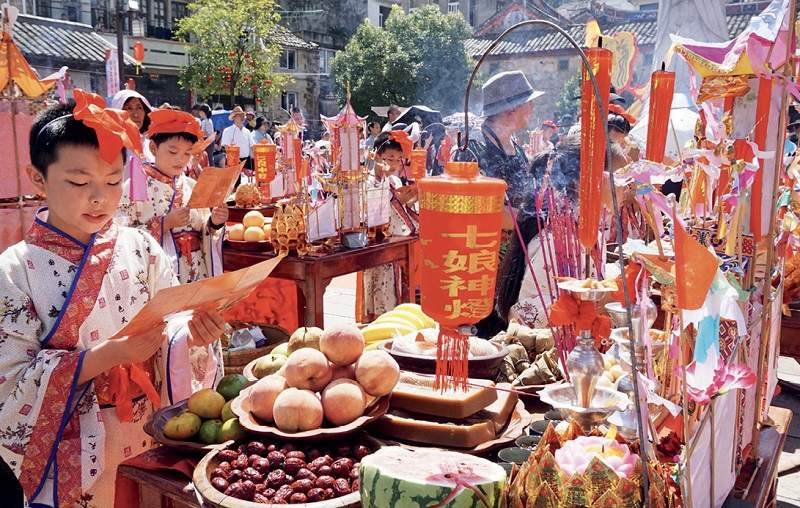
People are celebrating “Kids’ Day” events in the town of Shitang, Wenling City in east China’s Zhejiang Province as part of the traditional Double Seventh Festival celebrations.
On the seventh day of the seventh month of the lunar calendar in the town of Shitang, Wenling City in east China’s Zhejiang Province, many households celebrate a festival that is commonly called “Kids’ Day” for children aged 1-16 by praying to the children’s guardian god “Lady Qiniang.” More than 300 years ago, most of the residents here were immigrants from Hui’an and Quanzhou of southeast China’s Fujian Province. One of the customs they brought with them from their old hometowns was offering dolls during the Double Seventh Festival, and this practice they continue doing today. Shitang’s Double Seventh Festival custom was included in the national intangible cultural heritage list in 2011.
It is generally believed that “Lady Qi-niang” is the Weaving Girl well-known in Chinese folklores. The festival is held on the seventh day of the seventh lunar month, when she unites with her mortal husband and their children, to pray for the safe and healthy growth of children. Before the festival, local residents prepare colorful paper pavilions and sedan chairs for their children under 16. These paper offerings are generally made of bamboo strips and colored paper by artists in fishing villages. The two- or three-story pavilions feature the images of a number of opera story characters. This is the busiest time of the year for those paper artists, as each family buys one pavilion or one sedan chair sculptures every year for children under the age of 16. For the 16-year-olds, Kids’ Day marks their entrance into adulthood, a clear defining line of them moving into the next phase of life, which reminds them of the kinds of responsibilities they will take on in life from now on.
The ceremony is generally officiated by family matriarchs, such as grandmothers, who burn incense and pray for the health and wisdom of the children. In the past, girls could only have paper palanquin, but now they can also receive the colorful pavilions which used to be used only by boys. On the day of Double Seventh Festival, a number of offerings are served including locally-brewed wine, seven wine cups, and various kinds of fruits that are placed on trays, as well as local noodles, chicken, dried fish, eggs, and zongzi (steamed rice dumpling rapped in a leaf). After making a wish by offering incense, the pavilion and chair sculptures are burned on an iron pot, and the ashes are gathered up and poured into the sea, symbolizing that the children will have a promising future.
Today, in order to preserve the paper making craft, a course on paper pavilion making has been started at local schools in Shitang. Paper making artists regularly visit the schools to teach the courses to help promote the passing on of the age-old craft which has carried blessings from generation to generation.